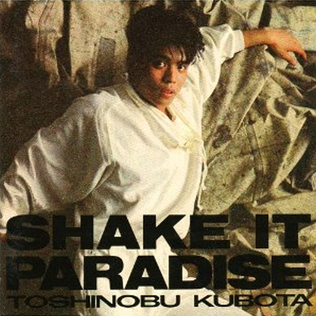Toshinobu "Toshi" Kubota is a Japanese singer, songwriter, musician, music producer, and radio personality. He has produced six million-seller records and thirty-three Top 40 singles during his career. Kubota is currently part of Sony Music Japan. In addition, he has composed and written songs for many singers including Hiromi Iwasaki, Misia, Toshinori Yonekura, Kyōko Koizumi, and many other recording artists.

Complete Best is the second English-language greatest hits album by Canadian singer Celine Dion, released exclusively in Japan on 27 February 2008. It reached number three on the Oricon Albums Chart, was certified Gold by the RIAJ and has sold 173,100 copies in Japan in 2008.

La La La Love Thang is the ninth studio album of Japanese singer Toshinobu Kubota, released on December 2, 1996. The album has been certified triple platinum by the Recording Industry Association of Japan. It was also successful in international music markets and yielded two singles: "Niji No Grand Slam" and "La La La Love Song". Kubota then embarked on his first international concert tour in 1996, which he titled the Oyeees! Tour. A live album, Toshinobu Kubota Concert Tour '96: Oyeees!, was released which featured footage from the tour. As of February 2012, La La La Love Thang has sold over 840,000 copies worldwide.
The discography of Japanese R&B singer Toshinobu Kubota consists of nineteen studio albums, ten compilation albums, two tribute albums, and over seventy singles. In 1985, Kubota signed with Sony Japan and began producing and writing songs for many of label's singers and groups. Under the label, Kubota released his first single, "Shitsui no Downtown" in June 1986, followed by "Time Shower ni Utarete" in December. Both songs were well received by radio, placing fifty-three and thirty-five on the Oricon Singles Chart. In September 1986, his debut album, Shake It Paradise, peaked at number twenty-two and remained on the Oricon Albums Chart for seven consecutive weeks. Shake It Paradise became certified million. The following year in 1987, Kubota's second studio album, Groovin', debuted at number thirty-three and was certified million. In February 1988, Kubota released "You Were Mine", which debuted at number two. In September 1988, Kubota released his third album, Such A Funky Thang!. The album peaked at number one and was certified million. The album also spawned the top-charted single "Dance If You Want It", which peaked at number three. In 1989, Kubota released his compilation album, The Baddest. The album also peaked at number one and was certified million.

Shake It Paradise is the first studio album of Japanese singer Toshinobu Kubota, released on September 10, 1986. Under the label, Kubota released his first single, "Shitsui no Downtown" in June 1986, followed by "Time" in December. Both songs were well received by radio, placing fifty-three and thirty-five on the Oricon Singles Chart. "Shake It Paradise" peaked at number twenty-two and remained on the Oricon Albums Chart for seven consecutive weeks. Shake It Paradise became certified platinum.

Groovin' is the second album by Japanese singer Toshinobu Kubota, released on April 22, 1987. The album peaked at number 33 on the Oricon Album charts, and sold over a million copies, becoming a certified Million. Following the release of the album, Kubota went on "Keep On Dancing Tour", and later released the concert DVD Keep On Dancing.

The Baddest is the first compilation album of Japanese singer Toshinobu Kubota, released on October 8, 1989. The album peaked at number one and was certified million.

Bonga Wanga is the fourth studio album of Japanese singer Toshinobu Kubota, released on July 15, 1990. Under the label, Kubota released his first single, "Be Wanabee" in October 1990, followed by "Mama Udongo" in March 1991. The lead single "Be Wanabee" charted at number 16 on the Oricon Weekly Singles chart. "Bonga Wanga" became Kubota's first album to peak number one on the Oricon Albums chart. The album also became certified million. That album contains several English lyrics.

Kubojah: Parallel World I is the fifth studio album of Japanese singer Toshinobu Kubota, released on September 21, 1991.

Gold Skool is the sixteenth studio album of Japanese singer Toshinobu Kubota, released on August 3, 2011. The album charted at number 3 on the Oricon Albums chart and remained on the charts for total of 18 weeks. The album sold over 78,124 units in Japan.

Timeless Fly is the fifteenth studio album of Japanese singer Toshinobu Kubota, released on February 24, 2010. The album charted at number 9 on the Oricon Albums chart and remained on the charts for total of 26 weeks. The album sold over 16,063 units in Japan.

United Flow is the twelfth studio album by Japanese singer Toshinobu Kubota, released on April 10, 2002. The album sold over 68,000 units in Japan.

As One is the eleventh studio album of Japanese singer Toshinobu Kubota, released on September 27, 2000.

Soul Tree: A Musical Tribute to Toshinobu Kubota is a tribute album by various artists, released on February 25, 2004. The album was a tribute to Japanese singer-songwriter and musician Toshinobu Kubota. The album features performances by BoA, Soul'd Out, The Gospellers, Naniwa Express, Mika Nakashima, Soulhead, Atsushi, Sowele, Skoop On Somebody, Misia, Junpei Shiina with dance man, Rhymester, and Super Butter Dog Marcket. The album charted at number 9 on the Oricon Albums chart.

The Baddest II is a compilation album of Japanese singer Toshinobu Kubota. The album released on September 22, 1993, summing up various singles from Kubota. The album peaked at number one and spent twenty-three weeks on the Oricon Weekly Albums chart. The album became certified triple platinum, selling over 791,000 copies in Japan.

The Baddest: Only For Lovers In The Mood is a compilation by Japanese singer Toshinobu Kubota. The album was released on July 24, 2002 on Sony Music Entertainment. Unlike its predecessors, the album only features love songs, excluding the Kubota's hit singles from the album. The album charted at number 22 on the Oricon Weekly Albums chart and remained on the charts for two weeks.

Love & Rain: Love Songs is a compilation album by Japanese singer Toshinobu Kubota. The album was released on November 24, 2010 on Sony Music Entertainment Japan and peaked at number 11 on the Oricon Weekly Albums chart. The album features the songs "Love Rain " and "Rain", which had just been newly recorded at the time.

The Baddest: Hit Parade is a compilation released by Japanese singer Toshinobu Kubota. This album was released in Japan at the end of November 2011 to commemorate the twenty-fifth anniversary of Kubota's music. The album charted at number 2 on the Oricon Weekly Albums chart and remained on the charts for a total of 38 weeks. The album became certified platinum, selling over 351,049+ units in Japan.

"Love Rain (Koi no Ame)" is a song recorded by Japanese R&B singer Toshinobu Kubota for his compilation album, Love & Rain: Love Songs (2010). The song was released on June 6, 2010, as the lead single from the album.

Leo-Nine is the fifth studio album by Japanese singer LiSA. It was released on October 14, 2020, through Sacra Music and Sony Music Japan. Leo-Nine marks the singer's first full-length project in over three years since Little Devil Parade (2017). Like Little Devil Parade, Leo-Nine features a wide range of contribution from composers and producers, including long-time collaborators Pablo, Ryo Eguchi, Koichiro Takahashi, and Shota Horie. The album sold over 66,000 copies in its first week, reaching the number one spot on both Oricon Albums Chart and Billboard Japan's Hot Albums chart. Along with "Homura" debuting at number one on the Japan Hot 100, LiSA became the first artist ever to debut atop the Billboard Japan's charts simultaneously. The album has since received a gold certification from the Recording Industry Association of Japan (RIAJ).

















